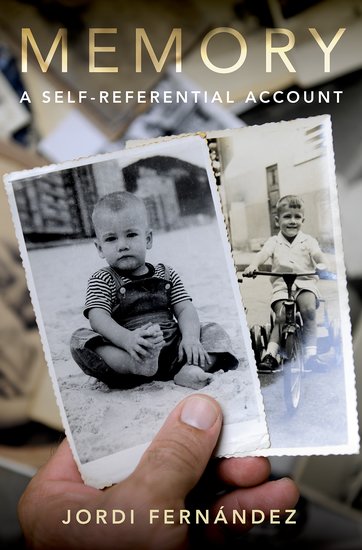This week, I’m writing a series of posts on my new book Memory: A Self-Referential Account (Oxford University Press, 2019). The post today concerns the topic of chapter five, the phenomenology of memory and, in particular, the feeling of a memory as being one’s own (a ‘feeling of mineness’ in what follows).
I defend the view that the feeling of mineness is real, and I offer a proposal about the nature of this feeling. The defence of the feeling of mineness is made on the basis of a mental disorder, disowned memory, wherein the subject is aware of having some memories that, nonetheless, they disown. There is one relatively clear case of this disorder; the case of patient R.B. discussed by Stanley Klein and others. If the best explanation of why patient R.B. disowns some of his memories is that he does not experience them as being his own, then it seems that the experience of having a particular memory can be dissociated from the feeling of the memory as being one’s own. And if those two features of the phenomenology of memory can be separated, as it seems they are in the case of patient R.B., then we should conclude that they are distinct and, therefore, that the feeling of mineness in memory is real.
A different question is what this feeling amounts to. It has been proposed that the feeling of owning a memory is the feeling of being identical with the person who, in the past, was the bearer of the perceptual experience in which that memory originates. One worry for this view is that patient R.B., who is supposed to lack this feeling, disowns some memories that he reports as being ‘of me’. He also disowns some memories that he reports as memories of being at certain places, and of doing certain things (as opposed to memories of someone being at those places, and of someone doing those things). This kind of talk suggests that patient R.B.’s disowned memories present some scenes to him which appear to R.B. to have involved him specifically. Another worry for this view is that patient R.B. claims to be ‘re-living’ the remembered scenes, and having ‘a sense of being there’, when he reports some of his disowned memories. This kind of talk suggests, too, that R.B. has the feeling that he is the person who, in the past, experienced the remembered scenes.
Accordingly, I propose an alternative answer to the question of what the feeling of mineness in memory amounts to. I propose that it amounts to experiencing the relevant memory as matching the past. This idea is consistent with the details in patient R.B.’s reports mentioned above. The idea is that patient R.B.’s memories are presenting scenes to him which appear to have involved him. But they are not presenting those scenes to him as having happened in the past. Instead, they seem to be neutral on that matter.
In support of this idea, I highlight the fact that patient R.B. uses two telling analogies to explain what it is like for him to have those memories. On the one hand, he says it is like imagining the relevant scenes as being told by someone else. This makes sense if the feeling of mineness that is missing in those memories is the feeling that the memories match the past. For, when we imagine a scene on the basis of testimony, we do not thereby have the feeling that the scene we are visualising happened in the past. On the other hand, patient R.B. says that having memories that he does not own is like looking at pictures of the relevant scenes. This also makes sense if the feeling of mineness that is missing in those memories is the feeling that the memories match the past. For, when we look at a photograph of some scene, we do not thereby have the feeling that the scene took place in the past.
The remaining question is what, if anything, could be responsible for this feeling in the contents of our memories. I appeal, once again, to the view according to which memories represent themselves as being caused by perceptions of some facts in the past. And I focus on the fact that, according to this view, perceptions (that is, veridical perceptual experiences) of some facts are meant to be part of the contents of our memories. It seems reasonable to think, then, that if a memory represents itself as coming from a perception of a fact, then it represents itself as matching the past. And this, I claim, is where the feeling of mineness for our memories comes from.
A substantial assumption is needed to make this move, just like it was needed with regards to the temporal phenomenology of memory. This is the intentionalist assumption that the phenomenal features of mental states are due to their intentional features.


How would you deal mine-ness of false memories?